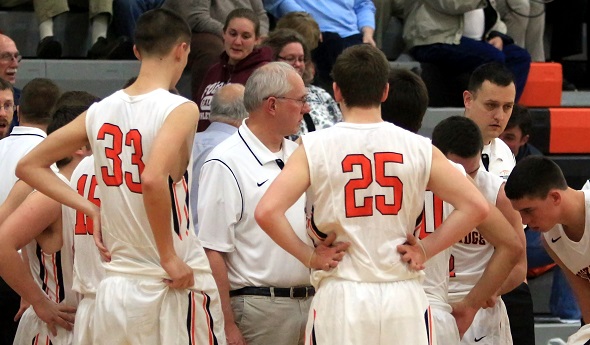
As Stockbridge Learns, Swoverland Earns 400
January 28, 2016
By Geoff Kimmerly
Second Half editor
STOCKBRIDGE – The new coach had won a lot of games. He must know what he’s doing, Mason Gee-Montgomery figured.
 And that’s all he knew about Randy Swoverland when the latter took over Stockbridge’s boys basketball program two years ago.
And that’s all he knew about Randy Swoverland when the latter took over Stockbridge’s boys basketball program two years ago.
But by the end of their first summer workout, Gee-Montgomery realized how hard the Panthers would be working that winter. And although the team finished only 8-13 that first season of 2014-15 (solid, actually, considering the team returned only one player with varsity experience), the now-junior point guard recognized his coach was putting the team in position to win – as long as he and his teammates held to what Swoverland was teaching them, and despite the fact some classmates didn’t stick around to help.
“It’s definitely a lot different than any coach we’ve had,” Gee-Montgomery said. “He takes the intensity to another level, and he expects things done a certain way. And if you don’t get them done that way, he’ll let you know.
“He definitely holds us accountable for the way we play, and I think that style of coaching suits the team we have because we hold each other accountable and he holds us accountable for ourselves. It just makes us play at another level.”
He could’ve been speaking for many of the teams Swoverland has led over the last four decades. And many of those players have been on the coach’s mind since his 400th career win Jan. 19, a 49-47 Stockbridge victory over Lansing Christian.
Swoverland has coached basketball at nine high schools over 37 years, building a record of 402-332. He also coached two seasons of boys and girls tennis, three of football and two seasons of men’s basketball at Adrian College since starting his coaching career in the fall of 1977 at Greenville High.
“When I got the win, I was happy. My guys were excited for me. But I also think back to all of the guys I coached in the 70s, 80s, 90s; they’re as much a part of it as what we’re certainly doing right now,” Swoverland said. “My thoughts and memories go all the way back to all of those teams.”
Although most in his new school’s community probably weren’t familiar with the past successes, Swoverland wasn’t exactly a stranger in a strange land when he picked up the milestone win on his newest team’s home court – Stockbridge is only 17 miles from Dexter, where he lives, has a son in high school and led teams to 245 of those victories.
He certainly has left an imprint on communities all over the Lower Peninsula and Ohio border, with 11 stops combined at those nine high schools and one college.
Stops along the way
Swoverland coached boys and girls tennis and also served as a boys basketball assistant at Greenville after finishing a four-year basketball career at Adrian College, where he was a captain as a senior. After Greenville came his first head coaching job, for a season at Edmore (now Blanchard) Montabella. He spent 1979-80 coaching Deckerville’s boys before heading back to Adrian College as an assistant men’s basketball coach; the head coach got fired and he lost his job there two years in. At the same time, Swoverland had been teaching and coaching football at Evergreen High School in Metamora, Ohio, and took over the girls basketball program there for one season. (He taught mathematics for 38 years total, retiring from the classroom after the 2013-14 school year.)
 Swoverland moved on to coach Hudson’s boys basketball varsity from 1983-91, leading the Tigers to a league championship in 1989, a District title in 1991 and a 102-72 record. Then came his first tenure at Dexter from 1992-2001 – his teams finished a combined 131-90 with four league and four District titles and posted a 22-2 record in 1997-98. A need for something new led him to Adrian High School for three seasons from 2002-04 – and realizing Dexter was a better fit led him back to coach the Dreadnaughts from 2005-13, during which time they finished 114-90 and won two District titles.
Swoverland moved on to coach Hudson’s boys basketball varsity from 1983-91, leading the Tigers to a league championship in 1989, a District title in 1991 and a 102-72 record. Then came his first tenure at Dexter from 1992-2001 – his teams finished a combined 131-90 with four league and four District titles and posted a 22-2 record in 1997-98. A need for something new led him to Adrian High School for three seasons from 2002-04 – and realizing Dexter was a better fit led him back to coach the Dreadnaughts from 2005-13, during which time they finished 114-90 and won two District titles.
Swoverland then took 2013-14 off from coaching – and missed it too much. He applied for and received the Stockbridge job that spring, taking over for Joe Wenzel, who also was the school’s athletic director and had coached in the district 11 seasons and the varsity during his last two.
The Panthers finished last winter with four losses over their final five games, but a combined eight points from finishing 12-9 instead. They also handed one of only two league losses to eventual Greater Lansing Activities Conference champion Lake Odessa Lakewood. This winter, the varsity has only nine players – but also nine wins, off to a 9-2 start and tied for second in the GLAC with a championship over holiday break at the Parma Western Holiday Hoops tournament.
“His level of consistency with the kids (impresses me); he’s very organized. Clearly he’s been doing it for a long time, so that helps with areas like that,” Wenzel said. “He has high expectations for the kids, and he holds them to it, and they rise to the occasion.”
But Swoverland gives them that opportunity to rise as well.
Dexter girls basketball coach and athletic director Mike Bavineau got his high school coaching start assisting Swoverland and worked with and around him for more than 20 years, getting a first-hand look at the strategist in action.
“I loved being on the sidelines with him. I watched him develop a system of play that always seemed to maximize his team’s ability,” Bavineau said. “The players may have never known it, but he is such a strategist that he will find a way to put you in the right place at the right time. Dexter and I were very fortunate to have him as a mentor and as a coach.
“You do not find many people who are (more) committed to his players and his program than Coach. I have the utmost respect for him as a coach and a friend.”
The branches of Swoverland’s coaching tree stretch broadly, considering both those who played for and coached under him and also those he’s affected during 31 years running the well-attended summer team camps at Adrian College and Siena Heights University.
His lessons through the years and many stops boil down to a few key points:
He teaches players to compete not against the opponent, but against their own potential – and measure against that, win or lose.
He emphasizes a unified front and working within the group, even when disagreeing with some of the decisions or direction – players aren’t allowed to stick out by wearing things like headbands with their uniforms, and his system isn’t built to create stars on the court, as all five starters this season average between eight and 13 points per game.
Finally, there are the life lessons he hopes they take with them like commitment and hard work – the ones he still hears about from former players when they’ve figured out what he meant years later.
“Coach has the best basketball mind I have encountered in 20 years of coaching. (And) his value system is beyond reproach,” said Brooklyn Columbia Central boys hoops coach Jason Rychener, who played for Swoverland at Hudson in 1989-90 and 1990-91 and coached under him at Dexter from 1995-2005. “I find myself still using the W.W.C.D (What would Coach do?) approach to issues that arise in my own program. In my view, he reached ‘legend’ status long before his 400th win.”
“Kids are still kids. They still want to play basketball. They still want to get something out of it,” Swoverland reflected. “You’re still teaching them life lessons. All of that stuff carries over, whether you’re coaching a Class B team or a Class A team.”
Making another impact
Stockbridge’s most notable sports success of late came on the football field over the last two seasons, as Gee-Montgomery – also a quarterback – set or tied three MHSAA passing records this fall with junior receiver/shooting guard Kolby Canfield hauling in 90 of those tosses and both in position to finish with some of the flashiest career numbers in this state’s history.
The boys basketball program, meanwhile, was coming off four straight sub-.500 seasons when Swoverland was hired and didn’t quite seem like a destination for a coach climbing toward 400 victories.
But he got a lay of the land both from Katherine Kuzma, the girls soccer coach and a former student of his at Dexter, and Josh Nichols, a teacher and former coach at the school who played at the University of Minnesota. Swoverland came away with an impression that Stockbridge athletes were competitive and would work hard, and the scenario has been similar to when he was at Hudson and also had a number of three-sport athletes while coaching in more of a football-type town. He also had a team of only nine players for a season with the Tigers, and has used all of that past experience during this one. He also brought along assistant Rick Weaver, who played for him at Dexter in 1998-99 and 1999-2000.
The biggest challenge has been getting a new school’s athletes to buy in to his “old-fashioned” style which emphasizes man-to-man defense and shot selection, and he’s working to get more offseason buy-in as well so he can help develop their skills. His system is based in large part on conversations with hundreds of coaches over the years, and Swoverland recalls specifically when his Hudson and Dexter teams hit a groove where their experience and execution resulted in wins over more talented opponents. Stockbridge isn’t there yet, but it’s moving in the right direction.
But not during the first half Tuesday. The Panthers were struggling against Jackson Northwest, playing below their potential, and Swoverland let them know – although he didn’t have to say a word. A look his players have come to recognize said it all.
Stockbridge pulled away for a 51-41 win.
“Last year we struggled with some of the things he had us doing, but we returned almost everybody and we’re all more familiar with the system and what he expects of us,” Gee-Montgomery said. “Winning makes everything better, and when we all play well, and we get praise from him, that’s when it feels really good."
 Geoff Kimmerly joined the MHSAA as its Media & Content Coordinator in Sept. 2011 after 12 years as Prep Sports Editor of the Lansing State Journal. He has served as Editor of Second Half since its creation in Jan. 2012. Contact him at [email protected] with story ideas for the Barry, Eaton, Ingham, Livingston, Ionia, Clinton, Shiawassee, Gratiot, Isabella, Clare and Montcalm counties.
Geoff Kimmerly joined the MHSAA as its Media & Content Coordinator in Sept. 2011 after 12 years as Prep Sports Editor of the Lansing State Journal. He has served as Editor of Second Half since its creation in Jan. 2012. Contact him at [email protected] with story ideas for the Barry, Eaton, Ingham, Livingston, Ionia, Clinton, Shiawassee, Gratiot, Isabella, Clare and Montcalm counties.
PHOTO: Stockbridge boys basketball coach Randy Swoverland huddles with his players during a break in the action this season. (Photo courtesy of Frazzini Photography.)
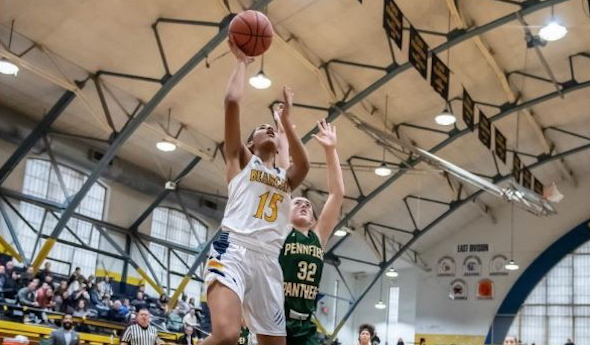
Hoops Finds Annual Home During Holidays
December 27, 2019
By Ron Pesch
Special for Second Half
Nothing says the Holidays like a high school basketball tournament.
It started, like many things do, with a drip. Well, make that a dribble.
The Michigan High School Athletic Association has allowed Holiday basketball tournaments for years. When was the first? That’s hard to establish. No one really kept track of such. A 1934 Wakefield News article indicates that a “Christmas Tournament will be held for the (Gogebic) Range teams at Wakefield December 27 and at Ironwood December 28.” Hurley, Bessemer, Ironwood and Wakefield were entered in the “blind” tournament, with opponents drawn just before game time. It was a new idea, at least in the Upper Peninsula.
“Nothing of its kind has ever been attempted in the Peninsula before,” stated the Ironwood Daily Globe. The tournament, won by Hurley, was a financial success. After expenditures, including the purchase of trophies, profit equaled enough that $22.42 was distributed to each school competing in the tournament. Plans were announced to bring back the tournament in a larger format the following year. It did return the following December, with the same teams in the same format but with all games played in Wakefield. This time out, Ironwood topped Hurley 22-21 for the tournament title.
In the Lower Peninsula in 1935, an All-Berrien County Holiday tournament was held Dec. 26, 27 and 28, with Three Oaks winning the Class B-C division title, 15-13 in the final over Berrien Springs. St. Joseph Catholic emerged as the Class D victor with a surprising 27-26 win over the reigning MHSAA state champ from Stevensville. The 14-team competition was played at Niles High School. Attendance was “slim, very slim” for the opening day of the tourney. The event did not return in 1936.
A similar, but much smaller, event was staged in Berrien County in 1941 with the Bridgman Class C Invitational. The tournament featured seven teams with contests spread over three nights. It was a success.
“Some 450 paid admissions were checked in Wednesday night for the championship finals, which Bridgman won from Berrien Springs. … The total paid admission for the three night event was 1,420 fans with a gross gate of approximately $400.”
By the mid-1940s, the idea of playing prep basketball during the Christmas lull had begun to take off across the state.
In December 1946, before a crowd of 1,500 at the Flint IMA Auditorium, Holland, the reigning Class A champion, downed Flint Northern 51-48 behind a pair of late field goals by Ken ‘Fuzz’ Bauman in the first annual Motor City Invitational. In Jackson, Detroit Catholic Central won the Michigan Catholic Invitational, beating Kalamazoo St. Augustine, 42-40. Bridgman again snagged the title at the Sixth Annual Berrien Class C Christmas Holiday Tournament. It was the Bees’ third Christmas championship in four years. The Little Eight Conference Holiday Tournament was played across four school gymnasiums as the calendar transitioned from 1946 to 1947. Bangor downed Covert, 34-29, in the championship contest hosted at Watervliet High School on Saturday, Jan. 4.
“Holiday tournament basketball has really caught on in Michigan,” said Hal Schram in the Detroit Free Press in 1947. “There will be no Christmas-New Year’s rest for at least 60 Michigan high school squads which have jumped at the chance to sharpen their collective shooting eyes for the long season ahead. … At last count, tournaments will be played between Dec 17 and Jan 3 at Flint, Saginaw, Grand Rapids, Jackson, Lincoln Park, Fremont, Negaunee, Marquette, Benton Harbor and Detroit.”
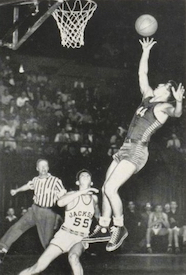 The same eight schools that played at the first Motor City tournament – Jackson, Grand Rapids Central, Holland, Muskegon Heights, Monroe, Midland, Flint Central and Flint Northern – were invited back for the second year. According to Schram, “Not a single participating school of a year ago wanted to be left out.”
The same eight schools that played at the first Motor City tournament – Jackson, Grand Rapids Central, Holland, Muskegon Heights, Monroe, Midland, Flint Central and Flint Northern – were invited back for the second year. According to Schram, “Not a single participating school of a year ago wanted to be left out.”
Jackson downed Flint Northern in the title game, 39-34.
The Saginaw Invitational, hosted at Arthur Hill High School, boasted six Class A schools as well as Alma and Mount Pleasant, both Class B schools. Mount Pleasant surprised the field, winning the tournament with a 40-25 triumph over Dearborn Fordson in the championship game.
A year later in December, Schram wrote, “The Michigan High School Athletic Association wasn’t caught unaware when the tournament bug started to bite every sector of the state.”
“Never did we expect such a wave of tournament play as we will see during the next three weeks,” said Charles Forsythe, state director for the MHSAA, noting 34 Christmas vacation tournaments were scheduled between December 15 and January 8 during the 1948-49 basketball season. “Perhaps we’re lucky at that. The Oklahoma association has had to sanction 123 tournaments.”
Forsythe and Schram explained the reasons for the wave of popularity. Of particular interest was the fact that, at the time, a school sponsoring both football and basketball could play a total of no more than 24 games, combined, in the two sports. However, MHSAA rules allowed a basketball team the chance to play as many as three games during a Holiday tournament and be charged with only one of its allotted combination of 24 contests. (The MHSAA rules changed prior to 1972-73 to allow basketball teams a maximum of 20 games.)
Coaches could keep their squads sharp during the two-week layoff with games rather than just mandatory practices. And, as a bonus to all because tournaments were financed through gate admissions, invitations to larger tournaments meant teams got to “stay and eat at the best hostelries, go on sightseeing tours when not playing and play non-conference opponents from other sections of the state.“
Add in the chance to play before larger-than-normal crowds, and the formula for a successful tournament was cast.
Beginning with the 1950-51 season, the football-basketball rule was altered to count play in mid-season invitational tournaments as two contests. With the change, according to the Detroit Times, “the number of such meets dropped sharply.”
Only nine Holiday tournaments, involving 50-plus teams, were recorded by the MHSAA during the 1951-52 season: the 5th annual Flint Parochial Invitational, the Alpena Catholic Invitational (involving 16 teams), the 5th Annual Greater Lansing Invitational, the Albion College Invitational, the Twin-Five Conference Christmas Tournament (a 10-team replacement for the disbanded Little Eight Conference’s tournament), the Otisville Invitational, the Columbiaville Invitational and the 1st Annual Portland St. Patrick Christmas Invitational.
But by the 1960s, Holiday Tournaments were again regaining popularity, with more now focused on teams from a specific community or section of the state, especially among smaller schools.
The St. Patrick tournament was still going strong in 1966 – its 15th year – with an eight-team, four-day design. Williamston downed a Cinderella squad from Carson City, 64-44, before 1,100 fans at Portland to earn the championship. Other Mid-Michigan holiday tournaments played out in Chelsea and Swartz Creek at the same time.
The Flint Parochial League Tournament was a mainstay of the Holiday season until the breakup of the league in the early 1970s.
“Basketball tournaments have become popular around the state and nation in recent years,” wrote Wendy Foltz, longtime Battle Creek Enquirer sports editor, before the kickoff of the inaugural Battle Creek Central Holiday Cage Tournament in 1968. In a twist that harkened back to earlier days, the eight-team event represented nearly every section of lower Michigan. “Battle Creek never has been a rabid basketball town like some around the state,” added a hesitant Foltz, noting a hope that the event could at least break even.
Hosted at the Cereal City’s historic Fieldhouse, built in 1928, that first tournament was won by host Battle Creek Central, which downed Traverse City 71-53 before a crowd of 2,000. Phil Todd led the Bearcats with 29 points, including 21 in the first half, while 6-foot-8 Tom Kozelko paced TC with 24. Muskegon Heights won the consolation game, holding off a late Ypsilanti Willow Run rally, 78-77. Other schools competing were Battle Creek Lakeview, Grand Blanc, Romulus and recently-opened Jackson Lumen Christi.
Chuck Turner, Central’s head coach, and junior varsity coach Jack Schils had contacted 60 schools during the summer of 1967 to organize the 12-game schedule.
“The response was terrific,” said Schils, who added, “Many schools could not accept because of schedule commitments but want to enter a year hence.”
The Battle Creek tournament was back in 1969, again hosting teams from near and far. Schils noted that cost ran high when teams were brought in from long distances: “However, this type of tournament is highly desirable so we hope fans will support it.”
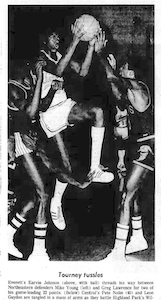
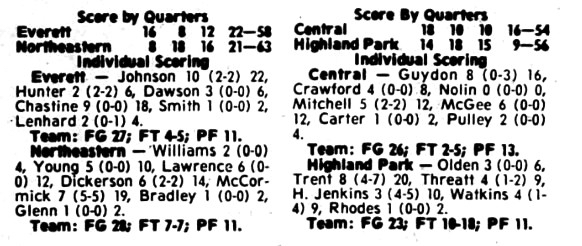 But the event was discontinued following the 1970-71 season when the “eight team format became too unwieldy,” according to the Enquirer “… and both crowd and the quality of play declined.”
But the event was discontinued following the 1970-71 season when the “eight team format became too unwieldy,” according to the Enquirer “… and both crowd and the quality of play declined.”
Pared down to a four-team format, it returned in a big way in December 1975. The tournament saw standing-room-only crowds of more than 3,000 for games between Battle Creek Central, Detroit Northeastern, Class A quarterfinalist Lansing Everett and reigning Class A champion Highland Park.
Detroit Northeastern downed Lansing Everett, 63-58 for the Cereal City championship trophy. Everett junior Earvin Johnson scored 22 points and, with teammate Reggie Chastine, was named to the all-tournament team along with Northwestern’s Wilbert McCormick, the tourney MVP, and his teammate Greg Lawrence. Highland Park’s William Trent and Battle Creek Central’s Leon Guydon also were named to the team.
By the 1980s, it seemed that the Christmas break nearly mimicked March in Michigan.
“I think a Christmas tournament really helps your program,” said Turner in 1980 to the Enquirer. He had taken over the head coaching position at Battle Creek in the fall of 1967 after a successful stint at Willow Run. “I don’t understand basketball teams having a preseason, playing three or four games, then taking two weeks off. When you get back, it’s like starting over.”
Besides Turner’s squad, the 1980 field included Detroit Western, Detroit Murray Wright and eventual winner Kalamazoo Central. The event would ultimately be re-christened the Battle Creek Central Chuck Turner Holiday Classic.
“The late Chuck Turner started bringing big games to the city over the holidays when he first started at the school in the 1960s,” wrote Bill Broderick in the Enquirer in 2018.
“Chuck started this because he wanted to give people the chance to come back home for the holidays and see everyone play. It’s been like a family reunion over the years,” Fred Jones told Broderick. Jones was a longtime assistant to Turner. “That we can keep it going in his name is great and hopefully we can keep if going for another 50 years.”
The girls are now part of the action. All five Battle Creek city schools – Central, Pennfield, Harper Creek, Lakeview, and St. Philip – were part of the event in 2018.
This year the Chuck Turner Central Field House Holiday Classic will again span two days – December 27 and 28 – and will again see all five city schools play on the historic floor.
Other Holiday tournaments scheduled this year include:
Petoskey Invitational – December 13-14
Raider Shootout – December 21
18th Annual Muskegon Area Sports Hall of Fame Classic – December 27
Earl McKee Classic – December 27-28
North Farmington Holiday Extravaganza – December 27
Motor City Roundball Classic – December 27
Cornerstone Invitational – December 27
Washtenaw Hoops Showcase – December 28
 Ron Pesch has taken an active role in researching the history of MHSAA events since 1985 and began writing for MHSAA Finals programs in 1986, adding additional features and "flashbacks" in 1992. He inherited the title of MHSAA historian from the late Dick Kishpaugh following the 1993-94 school year, and resides in Muskegon. Contact him at [email protected] with ideas for historical articles.
Ron Pesch has taken an active role in researching the history of MHSAA events since 1985 and began writing for MHSAA Finals programs in 1986, adding additional features and "flashbacks" in 1992. He inherited the title of MHSAA historian from the late Dick Kishpaugh following the 1993-94 school year, and resides in Muskegon. Contact him at [email protected] with ideas for historical articles.
PHOTOS: (Top) The Battle Creek Central and Pennfield girls face off during the 50th Chuck Turner Classic. (Middle) Shaheen Shaheen scores two points for Flint Northern, which fell to Jackson 39-34 during the 1947 Motor City championship game. (Below left) Lansing Everett’s Earvin Johnson makes a move toward the basket against Detroit Northeastern during the 1975 Battle Creek event. (Below right) Box scores from the 1975 tournament include Johnson’s 22 points in the 63-58 loss. Photos courtesy of the Battle Creek Enquirer, Lansing State Journal and Ron Pesch archives.)

